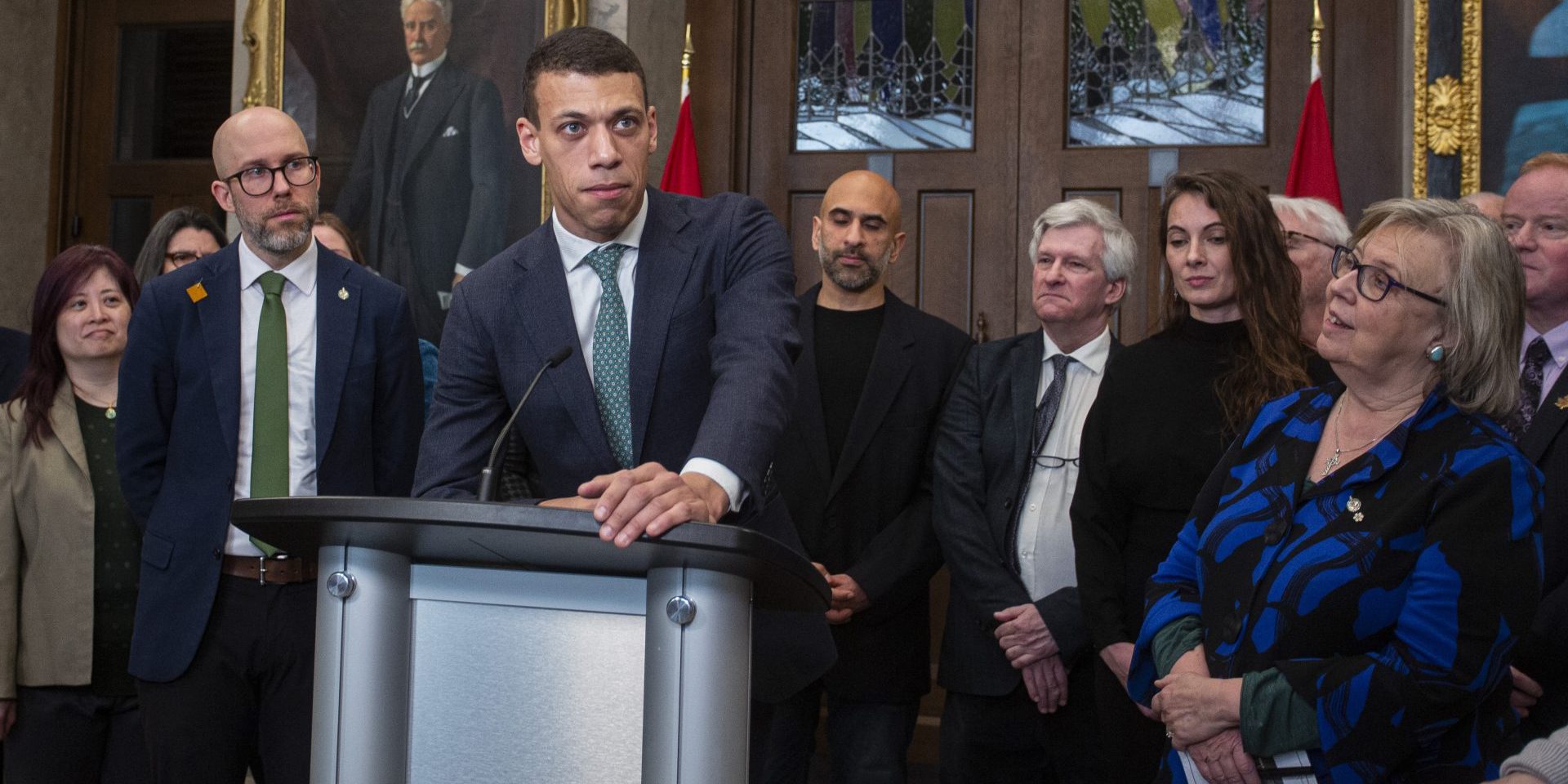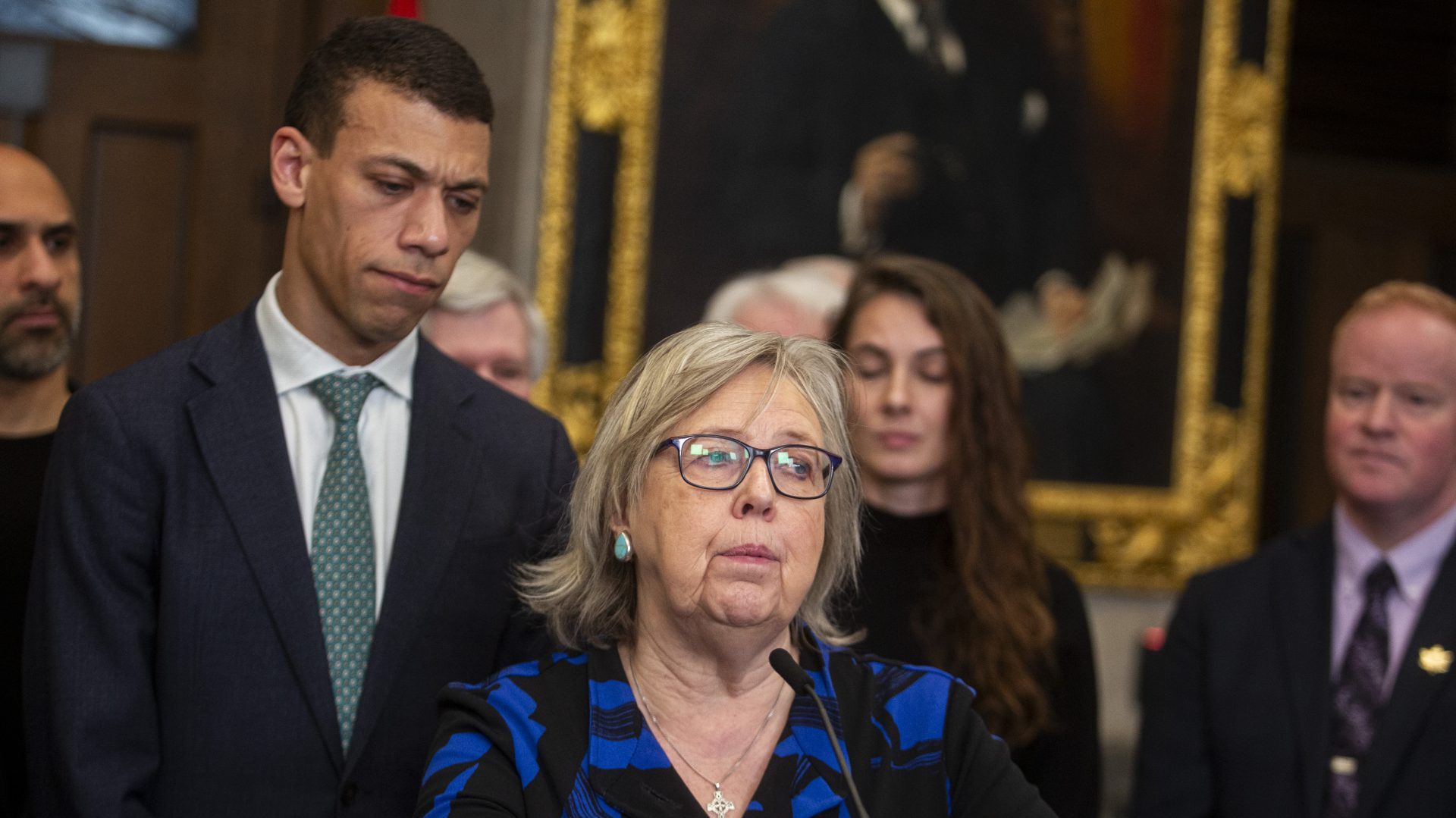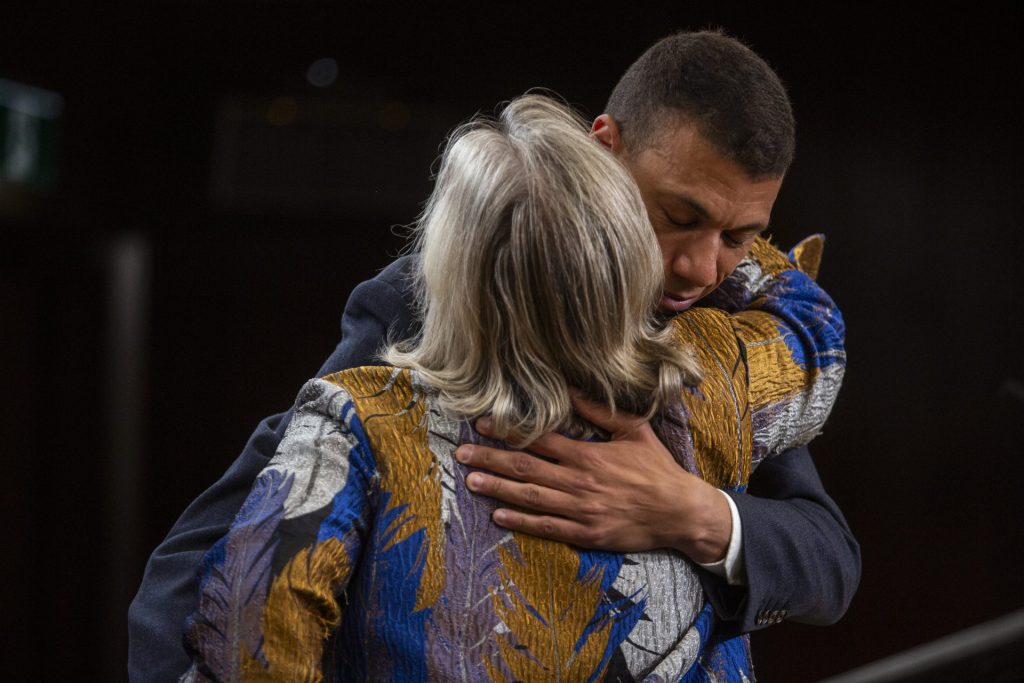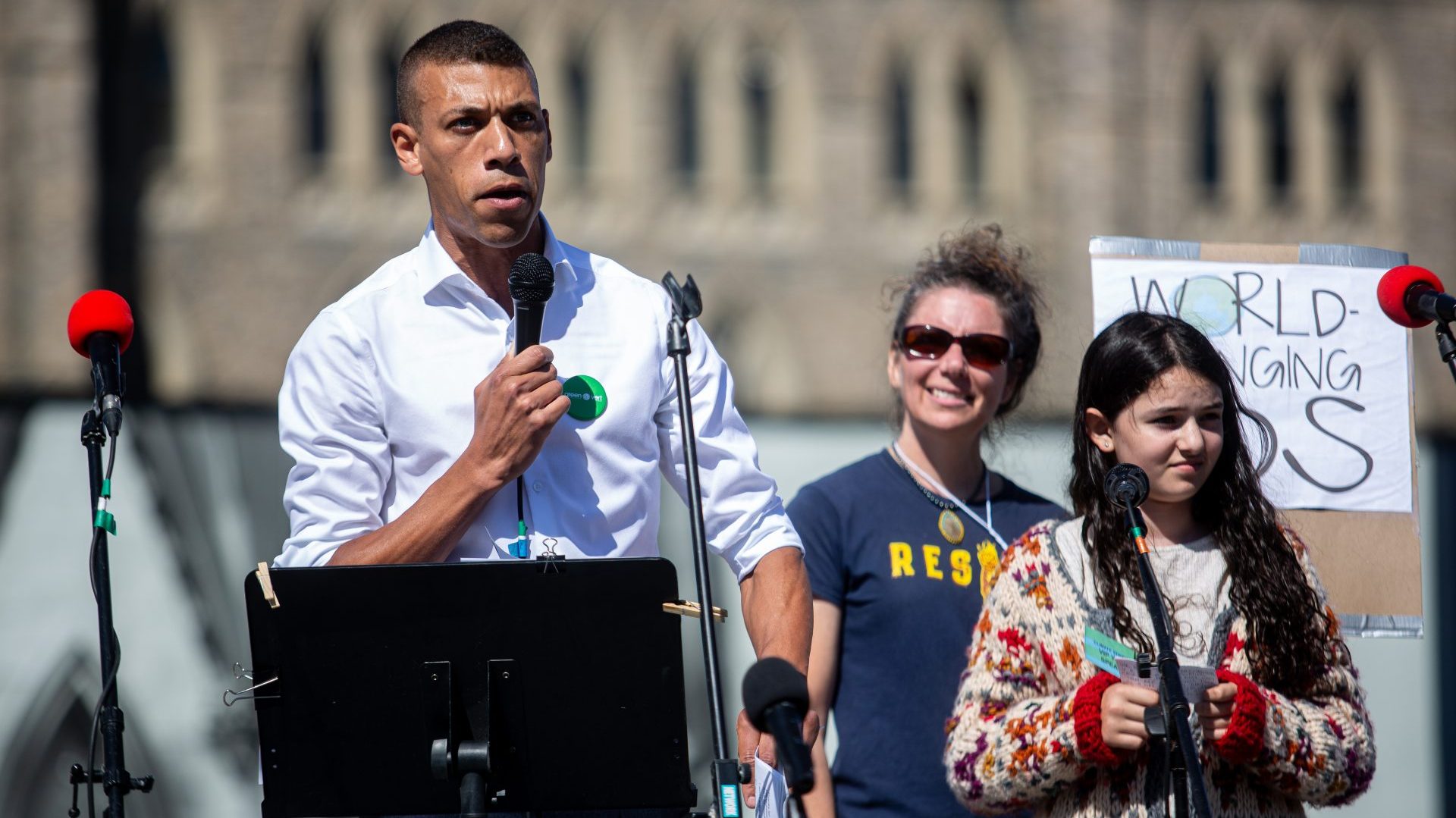Greens can tap into global network as Canada finds itself with few friends amid U.S. threats, say co-leaders

The Green Party’s leadership pair may still be a bit foggy on how they’ll share their new joint workload, but Elizabeth May and Jonathan Pedneault are clear that the “global Green” advantage is essential when it comes to standing up to the American president and tackling the global “poly-crisis” of climate change and geopolitical instability.
Last week, the Green Party of Canada’s membership overwhelmingly ratified an amendment to its constitution to officially recognize co-leadership following Pedneault’s announcement on Jan. 27 that he would be returning to politics.
More than two years after the 2022 leadership race, party members voted from Jan. 27 to Feb. 3 on whether to ratify the motion originally approved during a special general meeting last November, with 90.6 per cent of votes in favour of the motion. Of those who voted, nearly 90 per cent voted to confirm May (Saanich–Gulf Islands, B.C.) and Pedneault as co-leaders.
May and Pedneault ran on a co-leadership slate during the 2022 race to replace former leader Annamie Paul, who had stepped down in 2021. However, since the party’s constitution had yet to be amended to allow a leadership duo, they had appeared on the ballot as individual candidates. After six ballots, May finished first out of six candidates with 4,666 votes, with Pedneault in third with 969 votes. He placed behind Anna Keenan in second, who also ran on a dual-slate with Chad Walcott, who placed fourth.

Pedneault was appointed deputy leader until the constitution could be amended. As that process continued to drag on, he announced last July that he would be stepping down, citing “personal reasons,” but did not disclose further details. In his return press conference last month, he clarified that those reasons were health related.
“Last year, early in the year, I did receive some fairly difficult life-altering news about my health,” Pedneault told reporters. “And even though I tried to keep going, at some point, it became very clear to me that I needed to take a bit of a step back and reflect about my place, not only in the world and politics.”
Pedneault cited United States President Donald Trump’s “despicable” re-election and the threat he posed to Canada as a major motivating factor in his decision to return.
“I simply couldn’t stand on the sidelines anymore,” Pedneault told reporters.
However, while the party’s constitution has officially been amended to allow for co-leadership, May and Pedneault said they will still have to decide who will lead in the next election, particularly who will sign nomination papers and participate in the leadership debates.

Following the November 2022 leadership election, May told The Hill Times that her “druthers” would be having Pendneault take the lead, but the pair now says they will make that decision together.
In a joint interview with The Hill Times on Feb. 5, Pedneault and May said the decision would be “consensus-based” between the two of them, as well as being put before the membership for approval.
“That doesn’t mean we won’t be co-leaders during the writ period, but JP and I will take the lay of the land together before the election,” May explained.
May said she expects the Greens to do “very well” in the next election, and confirmed that her goal remains increasing the federal caucus to 12 MPs—the minimum needed for official party status in the House.
“We’re focused on winning the seats we are certain are winnable, and there are many of them,” May said, adding that the party will be looking for “breakthroughs” in Quebec—where Pedneault says he plans to run—and expand its foothold in Ontario beyond MP Mike Morrice (Kitchener Centre, Ont.).
Previously, Pedneault made an unsuccessful run at the Notre-Dame-de-Grâce-Westmount riding in June 2023, following Liberal MP Marc Garneau’s resignation, but placed fourth behind the Conservative and NDP candidates in second and third, respectively, and the winner, Liberal MP Anna Gainey. Garneau, a former astronaut and cabinet minister, had represented the riding since 2008, and won his last three elections with more than 50 per cent of the vote.
Ahead of this year’s election, the Green Party will continue to work on completing its full campaign platform, which it fleshed out at the party’s “shadow cabinet” retreat on Jan 25-26, and expects to begin releasing individual planks “soon,” Pedneault said.
“We’ve got some ideas that I think Canadians will be very excited about when it comes to inequality, housing, and, of course, how we are to respond to the climate emergency,” Pedneault said, adding the party would be making a particular effort to ensure the issue isn’t eclipsed in the next election.
Pedneault said that the current political landscape “offers very little to excite Canadians,” given the possible choice between Conservative Leader Pierre Poilievre (Carleton, Ont.), “who’s been ranting the same thing for two years,” and “two milquetoast Liberal-ish” leadership frontrunners in a former finance minister and a former central banker whom Pedneault said are already backtracking on several of their past commitments to things like the carbon tax.
“What’s lacking right now is political parties and politicians with the courage to stand up to big business interests instead of recycling the same old political solutions that have taken us to the place we’re in right now,” Pedneault said. “I think Canadians will be looking for bold, resolutely progressive solutions to the problems we face as a nation right now, and I think Canadians will respond well to our solutions.”
May said that the backtracking by Mark Carney and Liberal MP Chrystia Freeland (University Rosedale, Ont.) on support for the carbon tax demonstrates the dearth of courage and leadership in Canadian politics.
“Canadians are sick of this sort of incrementalism, particularly around the climate crisis,” May said, adding that alongside climate change, Canada needs focused leadership to recognize the multifaceted poly-crisis facing the entire planet.
“We’ve got the climate crisis, increasing geopolitical instability, and out-of-control conflict zones, and we need the clear-eyed leadership prepared to tell the truth about what we’re facing,” May said.
May noted that, unlike the other federal parties, hers benefits from the alliance of “global Greens,” including politicians forming coalition governments in Australia, New Zealand, and Germany, where former leaders of the latter country’s Green Party—Robert Habeck and Annalena Baerbock—joined Chancellor Olaf Scholz’s government in 2022 as vice-chancellor and foreign minister respectively.
Pedneault said that network and partnerships with Greens in the European Union and globally will be “essential” in Canada’s response to “the threat Trump poses to Canada and democracies worldwide.”

“It is crucial that liberal democracies stand together in these extremely dark times, and Greens have the benefit of this strong network of people in the places where we need strong allies,” Pedneault said, adding that the response from Canada’s European allies to Trump’s threats has been “underwhelming” at best.
The lack of more vocal defences of Canada by its allies in light of Trump’s threats is a direct result of both Liberal and Conservative governments’ lockstep alignment with the U.S. in place of a genuinely independent foreign policy, Pedneault said. It shouldn’t surprise Canada that European countries wouldn’t lift their head to challenge the U.S. when Canada has demonstrated it wouldn’t do the same in reverse circumstances, he added.
“Our close alignment with the U.S., and abandoning any semblance of independence is now costing us friends,” Pedneault said.
Closer to home, the federal Greens will also be keeping a close watch on the Feb. 27 provincial election in Ontario to support Green Leader Mike Schreiner and his slate of candidates. Still, Pedneault said he doesn’t view that election as a test run for the federal party.
“We’re standing very closely with [Schreiner] and the great team they’ve got there, but this is an Ontario election,” Pedneault said. “Our platform will be our own, and it will respond first and foremost to the country’s needs as a whole.”
According to polling aggregator 338Canada, the Ontario Greens are polling slightly higher than their federal counterparts at six per cent, compared to four per cent nationally, with similar levels of support for the federal party in Quebec and Ontario. May’s chances of winning her Vancouver Island seat are projected as a toss-up, with a slight edge over the second-place Conservatives.
The Hill Times






 LICENSING
LICENSING PODCAST
PODCAST ALERTS
ALERTS













